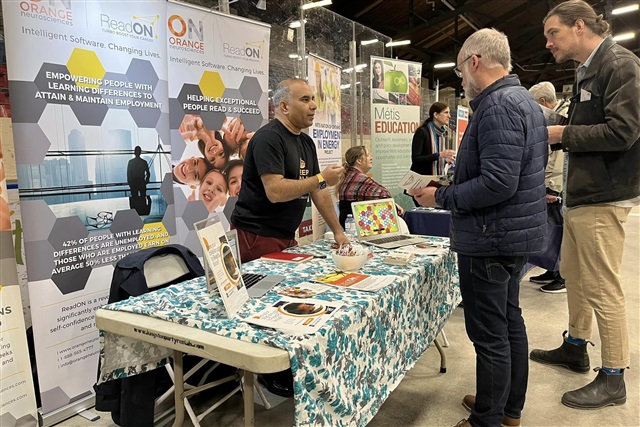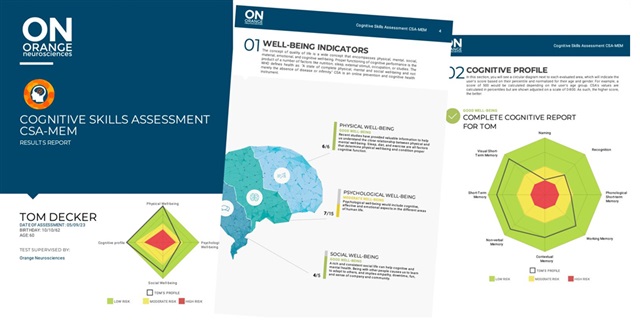Leveraging machine learning and AI, Orange Neurosciences has developed a game-based therapy platform for cognitive assessment.
What are the essential advantages of incorporating digital cognitive assessment and therapy in handling cognitive health conditions? The straightforward response likely revolves around time and resource savings. The ability to administer it remotely to multiple individuals simultaneously not only enhances accessibility but also scales up the impact.
The paramount benefit lies in "improving patient care experience, clinical outcomes, and boosting hospital revenue or savings," as highlighted by Vinay Singh, a former university professor specializing in biotechnology and bioinformatics.
While teaching biochemistry to nursing students, he observed a prevalence of mental health challenges, such as stress, anxiety, ADHD, and learning disabilities. This firsthand experience ignited a passion for addressing the lack of tools for evaluating neurological conditions in school systems.
That pivotal moment led to the creation of Orange Neurosciences, an Ontario-based digital health startup in psychiatry and neurology.

Dr. Vinay Singh. Credit: Orange Neurosciences
"Cognitive processes are interrelated and influenced by various internal and external factors. Neurological disorders often present overlapping symptoms, posing challenges in identification and treatment." As the founder and CEO of Orange Neurosciences, Singh emphasizes that the intricate nature of the brain and the shared symptoms among neurological conditions make assessment and therapy particularly challenging.
Driven to make brain health solutions accessible and affordable, especially considering the socioeconomic factors hindering intervention, Singh outlined the company's commitment to creating a comprehensive, end-to-end solution.
Technology's Role in Brain Health
What role does advanced technology play in Orange Neurosciences' approach? Singh explained the company's platform utilizes machine learning and AI to personalize cognitive assessments and therapeutic games based on an individual's interaction with the system. "Engagement or willingness is the key for any treatment to be successful. Our digital therapy is designed with a user feedback system. It adjusts the difficulty to optimize the therapeutic outcome without frustrating or boring the user."
Singh emphasized the transformative impact of Orange Neurosciences' digital tools, especially in cases of ADHD and autism. He shared a poignant success story of a 12-year-old diagnosed with autism who, after using the AI-backed platform, transitioned from a special needs school to a mainstream school. The therapy's ability to rewire the brain and improve cognitive skills presented a new avenue for social care and equity.

Credit: Orange Neurosciences
Overcoming Challenges in Digital Medicine
Despite the success stories, Singh acknowledged the challenges faced by Orange Neurosciences. The company operates in the relatively new field of digital medicine, necessitating extensive education and awareness efforts for both healthcare professionals and parents. He highlighted the importance of visibility in overcoming skepticism and the need for ongoing clinical trials to validate the SaaS platform's effectiveness.
There is usually a significant gap in technology accessibility between urban and rural areas. To reduce the digital divide, Singh explained the development of a "therapy-in-a-box" concept, allowing users in areas with limited internet access to utilize the platform via hardware devices connected to TVs or tablets.
The cost of the three-month therapy equals 3-5 sessions with a professional in a clinic. Moreover, there are many indirect cost savings for parents and caregivers who previously had to shuttle clients between different clinics and various professionals. "Our technology can be completed at hospitals, clinics, schools, or even at home," stated Singh.
Future Endeavors and Global Expansion

Credit: Orange Neurosciences
Looking ahead, Orange Neurosciences aims to expand its platform's accessibility by introducing vernacular languages, starting with Chinese and Hindi. "I am most excited about our upcoming version that will launch our platform in Traditional Chinese, Simplified Chinese, and Arabic to cater to a larger population and enter into the MENA and APAC regions."
Additionally, Singh expressed the company's interest in collaborating with pharmaceutical companies to become a next-generation digital medicine provider. "Our revolutionary technology can easily assess cognitive deficits and provide a therapist path for either complete diagnosis or starting our cognitive therapy that automatically adjusts itself for such cognitive deficits."
The company is actively researching specialized tools designed to address conditions such as autism, ADHD, and stroke rehabilitation. Currently engaged in clinical trials, the company conducts equivalency studies, comparing its offerings to the existing standard of care in psychological assessments. User studies are underway, focusing on LD/ADHD in the pediatric population and MCI/Dementia, along with stroke rehabilitation in the adult population. Additionally, collaborative efforts with a hospital are in progress to furnish insights into cognitive decline among patients with diabetes.
Data Privacy and Compliance
In addressing concerns about data privacy in utilizing digital tools, Singh highlighted the robust measures implemented by Orange Neurosciences. The platform is constructed on a SOC2-enabled secured framework hosted on Microsoft Azure Cloud, renowned for its secure environment. Emphasizing full compliance with HIPAA standards, Singh clarified that no additional information is required. Only the date of birth is required for therapy as part of standardized assessment.

Credit: Orange Neurosciences
The platform can generate a random username and password, creating a unique identifier for each session, refraining from collecting patient health or background data.
In a direct appeal to healthcare professionals, such as psychiatrists, neurologists, pediatricians, and psychologists, Singh offered a comprehensive overview of the company's journey, mission, and the transformative impact it has had on individuals with neurological conditions. This intersection of advanced technology and healthcare signifies a new era in digital medicine that promises to enhance brain health on a global scale.




